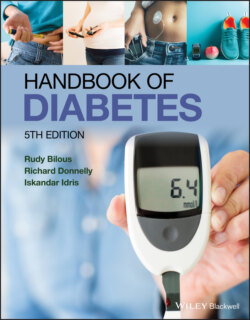Читать книгу Handbook of Diabetes - Rudy Bilous - Страница 24
Improving diabetes treatment and care
ОглавлениеA key public health strategy is to implement a systematic approach to evaluate the quality of care provided to patients with diabetes. In the UK, since 2004, disease‐specific indicators for both the processes of diabetes care and the attainment of treatment targets have been assessed through the pay‐for‐performance Quality and Outcomes Framework (QoF).
In the UK in 2017, NHS England has allocated £36m to target four clinical areas where intervention is likely to result in improved outcomes, better quality care and longer term cost savings (Table 4.2).
The number of diabetes treatments has increased sharply in the last 10 years. The global market for products used in the management of diabetes is in excess of $100b annually. Spending on insulin has increased faster than other diabetes drugs, and there has been a big shift towards analog insulins (Figure 4.10).
Digital health interventions are likely to play an important role in improving the quality of diabetes care in the next 5–10 years. Digital and E‐health initiatives will include:
Wearable technologies that monitor levels of exercise.
Apps which allow users to access health coaches.
Online peer support groups.
Provide the ability to set and monitor goals electronically.
Table 4.2 Transformation Funding in the UK in 2017 is targeting 4 key areas to improve quality of care, outcomes and to achieve longer term cost savings.
| Work stream | Approx funding |
|---|---|
| Improving Attainment | |
| of NICE recommended | £14m |
| Targets (HbA1c, BP, Lipids) | |
| Increased Access to | |
| Structured Education | £11m |
| For T1 and T2 DM | |
| Reducing the No of | |
| Amputations by Improving | £6m |
| Access to Multidisciplinary Foot | |
| Teams | |
| Improving Access to in‐patient | £4m |
| Diabetes specialist nurses |
Figure 4.10 The shift towards using new, expensive analogue insulins. IMS Health.
Figure 4.11 A structured lifestyle modification program (aimed at delivering >7% weight loss and 150 minutes of physical activity per week) is superior to drug treatment with metformin and placebo in diabetes prevention. Lifestyle intervention reduced the risk of type 2 diabetes by 58%.
Adapted from Diabetes Prevention Study. N Engl J Med 2002; 346: 393–403.
